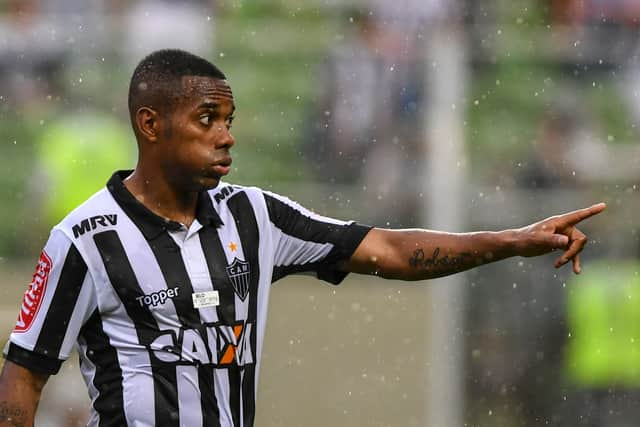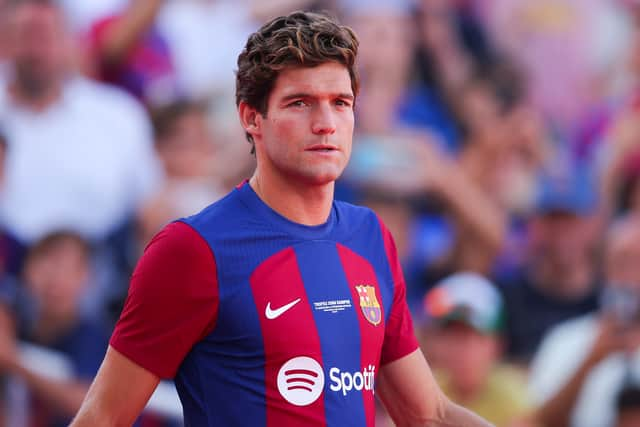QPR's Chair is just one of many - football teams need to reconsider playing criminals
and live on Freeview channel 276
On the surface, there was nothing remarkable about Queens Park Rangers’ 2-1 win over Rotherham United this weekend. A team battling relegation picked up three points against the side rooted firmly to the bottom of the Championship table. It was no great surprise, no records were broken, and none of the goals were especially spectacular. But there was one problem – the man who set up the winning goal, Ilias Chair, had been sentenced to two years in prison a day earlier.
Chair, an attacking midfielder who was a member of the Morocco squad that reached the semi-finals of the 2022 World Cup, was reportedly sentenced to a year in jail with a further year suspended by a court in Antwerp on Friday for an assault that took place in 2020 and which involved Chair striking a coach driver with a rock, fracturing his skull and leaving him in need of life-saving surgery. The driver still suffers “adverse reactions every day” as a consequence of the attack, according to his lawyer. Chair will also pay £13,400 in compensation to the victim.


Advertisement
Hide AdAdvertisement
Hide AdSo why was he playing football, just a day after his sentencing? There are the technical reasons, of course – he remains free pending an appeal and will only serve his sentence once the legal process in Belgium is completed – but the real question is why a club would want him to represent them at this point. Perhaps his appeal will be successful and the sentence overturned but for now, in the eyes of the law, Chair was responsible for a brutal assault. The sad fact is that too many clubs, and the fans that support them, have decided that results matter too much to care quite enough about who is making them happen.
“He’s an available player and I’m happy for him,” QPR manager Martí Cifuentes said after Chair assisted Chris Willock’s winner against Rotherham. “It was a very good performance and he’s a very important player for us.”
All of which surely misses at least some part of the point. If football clubs are community institutions which represent their town or borough on the national or even international stage, the way in which the board of almost every club wishes to their team to be presented, then why are they happy for that community to be represented by a player who has been found guilty of a serious crime?
Chair is hardly the first player to find himself in a starting eleven despite a criminal conviction. Many players have been signed and played despite possessing a criminal record, and it’s all too rare for much of a fuss to be made.
Advertisement
Hide AdAdvertisement
Hide AdTo take an example from the very highest level, Robinho played for three clubs after he was convicted and sentenced to nine years in prison in Italy for sexual assault in 2017, following the gang rape of a 23-year-old woman at a Milan nightclub. He was playing for Brazilian Série A side Atlético Mineiro at the time the sentence was handed down and played the full 90 minutes against Corinthians just three days later.
He went onto play in Turkey for Sivasspor and Istanbul Başakşehir before returning home to sign for Santos in 2020 – and it was only there that a meaningful stink was kicked up by supporters concerned about his presence at the club. His contract was cancelled six days after it was agreed after a sponsor withdrew funding, and he has not played professionally since. As Brazil does not extradite its citizens, he has not yet served his sentence in Italy.


Supporters have of course made their feelings known about being represented by players with serious criminal convictions. Recently, following the handing down of Dani Alves’ four-and-a-half year sentence for rape in Spain, citizens in his hometown of Juazeiro in Brazil used bin liners and tape to cover a statue which had been erected in his honour. In 2022 Scottish striker David Goodwillie, who had been found liable for sexual assault in a civil case, had his contract terminated by Clyde after protests from supporters, sponsors and the local council, who banned him from Clyde’s ground. Goodwillie was not convicted in a criminal court and maintains his innocence.
For every time that protests are made, however, there are many instances in which the fans of clubs – or the clubs themselves – have been all too happy to overlook convictions or serious allegations because of the quality of football the players in question could offer.
Advertisement
Hide AdAdvertisement
Hide AdThe list of high-profile players who have continued their careers after convictions is a long one. Joey Barton continued playing after two convictions for assault. Duncan Ferguson had one such conviction and continued his career, as did Dennis Wise and Leicester City’s Premier League-winning full-back Danny Simpson. Lee Hughes served three years for causing death by dangerous driving and was signed by Oldham Athletic upon his release from prison. Marcos Alonso committed a similar crime in Spain in 2011 and went onto play for Chelsea and Barcelona. Marlon King racked up eight criminal convictions over the course of his career for offences as wide ranging as wounding, credit card fraud and sexual assault.
There are many, many more examples. Not all were necessarily popular signings with supporters or especially successful, but Alonso’s career, for instance, never faltered after a female passenger in his car was killed when he drove while intoxicated and over the speed limit, and crashed.
Then there is the late George Best, an undisputed club legend at Manchester United and a hero to many fans of that club and of Northern Ireland. He has a statue outside Old Trafford as part of the 'United Trinity' with Bobby Charlton and Denis Law – despite the fact that he beat his wife repeatedly and served three months in prison for drunk driving, assault of a police officer and failing to answer bail. To an astonishing number of his fans, his violent crimes against women are easy to brush under the carpet because his football was so magnificent and his rock-star persona so charismatic. It is an order of priorities which is seldom challenged.
Of course, players who have been convicted and served their sentences have the right to continue a normal life – that is a core tenet of our justice system. But that should not automatically mean the right to play for the football clubs which claim to represent us and our communities. That is not a human right but a responsibility, one which some people convicted of serious crimes could be said to have shown themselves to be unfit for.
Advertisement
Hide AdAdvertisement
Hide AdDiscussing specific cases of living players who stand accused of - or have been investigated with regards to - serious crimes without a conviction against their names is almost impossible without running the risk of libel. But sufficed to say that there are many instances, some very well-known thanks to social media, of players who have been accused of serious sexual or other crimes continuing their playing careers unimpeded. And for every fan who voices their displeasure at their inclusion in the squad, all too many are willing to overlook the possibility that they are being represented by an alleged serious criminal.
There are countless worn-out old arguments that get trotted out in these instances, especially in cases of alleged rape or sexual assault. That they are innocent until proven guilty (yes, but that doesn’t mean that it wouldn’t be reasonable to suspend them pending investigation). That it was just a mistake made by a young man who didn’t know better (a sentiment which should never be applied to truly serious allegations). That the alleged victims may be lying (vanishingly rare). There are plenty of mental contortions that some fans – a substantial and vocal minority, at the very least – are prepared to undertake in order to justify the continued selection of players who may be serious criminals. Social media is rife with these dismissive and apologist attitudes.
It should be remembered that in cases of sexual assault, crimes of which many male footballers have been accused, the conviction rate in a justice system which requires proof beyond reasonable doubt and often demands that victims relive their trauma in giving evidence is shockingly low. The precise number of reported rapes or assaults which result in convictions is disputed by different sources but is in the single digits. A report published by The Guardian last year estimated that nearly 70% of rape survivors drop out of the justice process in the UK. A high percentage of rapists walk free and unconvicted, and far too few survivors receive justice.


There are no shortage of fans who speak out against the signings of players who have committed serious crimes – in Chair’s case, plenty of QPR supporters have voiced their despondency online after his name appeared on the team sheet – but there are all too many who simply don’t care, or are happy to overlook violent or sexual crimes if the football is good enough. One wonders whether they would be so happy to brush offences under the carpet if it was a member of their own family who had been the victim.
Advertisement
Hide AdAdvertisement
Hide AdFundamentally, the problem is that there is now so much money in running a successful football club, so much prestige in winning and such a great volume of bragging rights available for fans of those sides that a great many people – far too many people – have forgotten that these clubs are meant to be community assets. They are meant to be a source of pride, not just of points on the league ladder, and one wonders how much pride we should feel when the shirt that we love is worn by someone who has caused pain and hurt to others. It’s time more fans reminded their clubs of what they claim to be, and time more fans questioned their own priorities.
Comment Guidelines
National World encourages reader discussion on our stories. User feedback, insights and back-and-forth exchanges add a rich layer of context to reporting. Please review our Community Guidelines before commenting.
